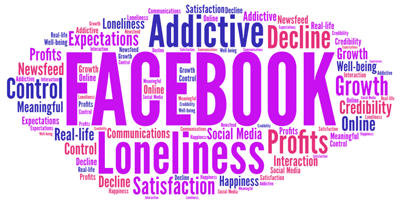The social media giant has changed its Newsfeed product to emphasize meaningful interactions, but different experiences on Facebook won’t make its users any happier.
_______________________________________________________________________________________
By Brad Berens
It’s hard to decide whether Facebook is more like beer, doughnuts or tobacco, but whichever comparison you prefer, there’s no doubt that Facebook is bad for you: recent research shows convincingly that as your Facebook use goes up your mental and physical health go down. (I’ll did into the research on this a little later.)
 That’s what makes Facebook’s claims around recent changes to its Newsfeed product infuriating: the company argues that when Facebook hurts people’s health and sense of well-being, it’s not because of how much time they are spending on Facebook (a quantitative argument); instead, it’s because they aren’t looking at the right things on Facebook (a qualitative argument).
That’s what makes Facebook’s claims around recent changes to its Newsfeed product infuriating: the company argues that when Facebook hurts people’s health and sense of well-being, it’s not because of how much time they are spending on Facebook (a quantitative argument); instead, it’s because they aren’t looking at the right things on Facebook (a qualitative argument).
This is like saying, “is eating too much chocolate ice cream is making you fat, giving you heart disease, and shortening your life? The answer is obvious: switch to vanilla ice cream!”
_________________________________________________________________________________________________
The problem is not about what you use Facebook to do, it’s how much you use Facebook. In an article for the American Journal of Epidemiology, the authors wrote, “We found that using Facebook was associated with lower life satisfaction, whereas having real-life friends and interacting with them was associated with higher life satisfaction.”
_________________________________________________________________________________________________
It is entirely in Facebook’s business interests to make this argument. A publicly traded company that depends on advertising for its revenue, Facebook needs steady growth in how much time its users spend on the platform and exposed to ads in order to meet the expectations of its investors and Wall Street generally.
However, to be happy, people should spend less time on Facebook, not the same amount of time doing different things.
Some background: last week, Facebook announced sweeping changes to its Newsfeed product that would emphasize “the most meaningful interactions between people” instead of click bait, celebrity gossip, and unverified claims posing as news. Facebook’s stock took a brief tumble on Wall Street as a result.
In an interview with Wired, Facebook VP of Newsfeed Adam Mosseri was careful to dance around the idea that these changes are the company’s response to Russian interference with the 2016 U.S. Presidential election, but a different Wired article reported:
People at Facebook say privately that Thursday’s announcement should be thought of as the first of many steps by Facebook to get control of its platform this year. That will likely include changes that make it easier to determine the credibility of news sources in Newsfeed, and an aggressive attempt to bring rules around election and political advertising in line with those for other US media. Facebook has previously said it will require more disclosures around US political advertising.
Regardless of the motive, changing Facebook’s highly addictive Newsfeed to emphasize “meaningful” interactions will not make users happier.
Facebook’s flawed argument
The Newsfeed changes have clearly been brewing at Facebook for quite a while, as indicated by “Hard Questions: Is Spending Time on Social Media Bad for Us?”— a blog post by David Ginsberg, Facebook’s director of research, and Moira Burke, a research scientist at Facebook. Ginsberg and Burke argue that actively interacting with one’s Facebook “friends” — commenting, communicating, reminiscing — promotes mental health while passively clicking and watching cat videos does not.
One problem with this argument is that the data lynchpin for it comes from a 2016 article in the Journal of Computer-Mediated Communication entitled, “The Relationship Between Facebook Use and Well-Being Depends on Communication Type and Tie Strength.”
Although the article was published in 2016, digging into the methodology section reveals that Burke and her co-author Robert E. Kraut of Carnegie Mellon gathered their data over two months during the summer of 2011.
2011 was a long time ago. That was the year, for example, when:
• Osama Bin Laden was killed
• President Obama released his birth certificate
• A tsunami hit Japan
• Congresswoman Gabby Giffords was shot
• A revolution hit Egypt
• Harry Potter and the Deathly Hallows Part 2 was the top movie
• Ashton Kutcher replaced Charlie Sheen on Two and a Half Men
• Oprah Winfrey aired her last show
In internet time, 2011 was the Pleistocene Era. For Facebook specifically, 2011 was before the company pivoted to being mobile first and acquired Instagram to improve its mobile game (both in 2012).
Facebook, in other words, is a different company in 2018 than it was when this data was collected, and the way that its users engage with Facebook has changed radically. Today, more people engage with Facebook on their smartphones than on desktop or laptop; that wasn’t true in 2011.
Using 2011 data to explain social media use in 2018 is like trying to pay for dinner using Yugoslavian dinar. (Yugoslavia ceased to exist in 1992.)
New, convincing research
More recent research that counters Facebook’s poor argument is not hard to find.
In a Harvard Business Review article published in April of 2017 — based on a study published earlier that year in the American Journal of Epidemiology — Holly B. Shakya of U.C. San Diego and Nicholas A. Christakis of Yale showed that “overall, the use of Facebook was negatively associated with well-being.”
Or, to quote the title of the HBR article, “The More You Use Facebook, the Worse You Feel.” Shakya and Christakis saw declines in mental health and physical health as well as increased Body Mass Index in their subjects as they used Facebook more.
The problem is not about what you use Facebook to do, it’s how much you use Facebook. In the Epidemiology article, the authors wrote, “We found that using Facebook was associated with lower life satisfaction, whereas having real-life friends and interacting with them was associated with higher life satisfaction.”
In our work at the Center, we’ve seen time spent with real-life friends decline as time spent online has increased. Here’s a picture of how this looks with the overall U.S. population over 16 years:
Time spent with family, friends, and online

Not all of that online time is spent on Facebook, but if real-life interactions help people to be happier, then a nearly 30-percentage point reduction in how much time people spend with each other is alarming — and increased Facebook use does nothing to counteract that.
Outside of academic studies, Kevin Holesh created an app called “Moment” that tracks what users do with their iPhones (an Android version is coming soon) and how they feel about what they’re doing. According to Moment data, when users are on Facebook less than 20 minutes per day they are likely to be happy about their Facebook use. When users are on Facebook for longer than 20 minutes per day, they are likely to be unhappy about their Facebook use.
In September, according to Nielsen data and Brian Wieser of Pivotal Research, American adults spent 37 minutes per day on Facebook: nearly twice the happiness threshold. Facebook wants that 37 minutes to increase, not go down.
Facebook is addictive by design (see Adam Alter’s recent book Irresistible for a deep dive into just how creepily deliberate this is). While the company might tweak the Newsfeed in order to emphasize person-to-person interactions, over the long term that will not come at the cost of overall time-spent on the platform.
The tobacco companies want people to smoke more because it’s good for business, even though cigarettes make people sick. Likewise, Facebook’s goal is not to make its users happy; the goal is to make its users use Facebook more.
One day soon we might see a screen pop up when we log into Facebook that reads, “WARNING: Facebook Use May Be Hazardous to Your Happiness.”
__________

Brad Berens is the Center’s Chief Strategy Officer.
See all columns from the Center.
January 18, 2018

